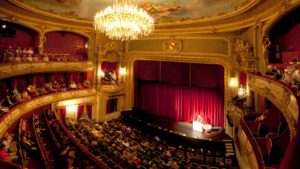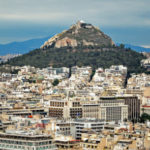Interesting facts about the theater
 The theater is one of the oldest ways of entertainment. Historians believe that the theater was born in primitive times, when our distant ancestors before the hunt performed ritual dances and celebrated pagan holidays with indispensable dances and ceremonies. The first country where a professional theater arose was Ancient Greece. Theater in the ancient world was one of the favorite shows of ancient citizens. It became more and more popular and popular throughout all historical periods. A soul was put into each performance and a lot of energy. Artists of all times and peoples tried to conquer the public with their productions and acting. A large team of talented people is working on a theater product. Modern theater is a synthesis of literature, music, choreography, and fine art. Russian theater is known all over the world. Foreigners visiting our country will certainly try to visit the Bolshoi Theater, known throughout the world. And 2019 by the decree of the President of the Russian Federation declared the Year of the Theater. Therefore, we decided to broaden our horizons. This article provides the most interesting facts about the theater.
The theater is one of the oldest ways of entertainment. Historians believe that the theater was born in primitive times, when our distant ancestors before the hunt performed ritual dances and celebrated pagan holidays with indispensable dances and ceremonies. The first country where a professional theater arose was Ancient Greece. Theater in the ancient world was one of the favorite shows of ancient citizens. It became more and more popular and popular throughout all historical periods. A soul was put into each performance and a lot of energy. Artists of all times and peoples tried to conquer the public with their productions and acting. A large team of talented people is working on a theater product. Modern theater is a synthesis of literature, music, choreography, and fine art. Russian theater is known all over the world. Foreigners visiting our country will certainly try to visit the Bolshoi Theater, known throughout the world. And 2019 by the decree of the President of the Russian Federation declared the Year of the Theater. Therefore, we decided to broaden our horizons. This article provides the most interesting facts about the theater.
Theater in the modern sense originated among the ancient Greeks. In the theater of the Hellenes, all three roles were played by only three actors. Each of them could depict several heroes at once. Each performance had a benefactor who sponsored exactly three actors. All roles in the Greek theater were played only by men. They portrayed women, masterfully doing this through reincarnation. Actresses appeared in the Greek theater at the sunset of the ancient Greek civilization, they played the role of prostitutes in pantomimes and mimes. And the order in the hall was monitored by a special person with a stick in his hand, who approached the riotous spectator and beat him with a stick.
The Guinness Book of Records reports on the smallest theater in the world, located in the Austrian town of Villach. The scene of the “Kremlin Court” is only 1.3 meters long and as much as wide. In the hall there are seats for only eight spectators. In a small wooden building of the theater, resembling a pavilion, plays are staged for Russian spectators, sometimes they perform in Slovenian and German. The ancient Romans invented the world’s first phonogram. The great antique playwright Livy Andronic loved not only to write plays, but also to play roles in the theater. Once, his throat became very sore. And he found a way out of the situation: the playwright simply opened his mouth on the stage, and the boy standing behind him spoke learned words for him.
Manoel in Valletta is the oldest existing theater in the world. When the theater was built in 1731, there is a theater museum. The hall is designed for 650 spectators and has unique acoustics. On banknotes and coins of many countries there are images of playwrights, theaters and theater paraphernalia. For example, the Bolshoi Theater is depicted on the hundred-ruble money of Russians. On one side of the bill is the theater building itself, the flip side is an illustration of the sculptural composition that adorns this world-famous theater.
The ancient Romans loved to go not only to the Coliseum for gladiator fights, but also to the theater. It often happened that the main character was dying according to the script. And the directors decided this way: the criminal sentenced to death was forced to stay for several hours as an artist who was destined to die according to the script. And on the stage this man was actually killed. The Roman public was so accustomed to the sight of blood and death that it did not experience any shock and pity.
In plays and plays it is impossible to do without props. It can be fake, that is, fake objects, very similar to real ones. The most interesting examples of props can be found in museums dedicated to the theater and its history. Spectators can see a piece of “great deception” at close range. There are many theater museums in the world. For example, the Central Theater Museum named after Bakhrushin, the Theater Museum in St. Petersburg. Museums of the theater are often located in the buildings of the theaters themselves.
Athenian theater during the heyday of the polis were required to attend all free Athenians. Those Greeks who had little finance were given free tickets for the performance. TV series last for several dozens and even hundreds of episodes. But in ancient Sicily, performances were staged with an endless continuation. Spectators gathered every evening to watch further events in the life of their favorite heroes, to see Roland’s struggle with the Moors. These performances went on for eight hundred years. And today on this island you can visit the performance with sequels, which will be shown to the audience daily for a whole month. Sicily is proud of its theatrical “Santa Barbara.” This is the cultural highlight of the Italian island.
In the theater of the Renaissance, gestures of hands, fingers and hands, known since ancient times, were actively used. The medieval Italian theater was full of gestures showing disaster (hands raised, head looking at the ceiling, symbolizing the sky) and gloating (wild laughter).
There is a unique theater in America. During the Great Depression in the United States, money quickly depreciated. Therefore, someone Robert Porterfield from Virginia came up with an individual chip. He began to take entrance fees to the theater not with money, but with things and food in the amount of exactly 40 cents. People brought dishes, food, jewelry, household items, clothes. This served as a ticket purchase fee. A similar idea in those days was picked up by many theaters in the United States. Today, in the US states there is no longer such a severe economic crisis as in the thirties of the last century. But despite the country’s financial well-being, the Virginia Barter Theater still takes things and food as payment. This tradition will soon be 100 years old. It is with this unusual approach to paying for tickets that this theater always attracts many spectators.
The Barbican Theater in London hosted a very original show over a decade ago. Instead of sitting in ordinary chairs, people watched a theatrical performance in beds. For convenience, they were provided with feather beds, pillows and blankets. They had the right to easily fall asleep and sleep, no one bothered them, and in the morning everyone would have breakfast in bed. The creators of this performance set a goal to cure the nervous system of the audience and become famous for the original approach to the performances.
The ancient playwright Frinich so saddened the audience with scenes about the ruin of the Greeks that all the spectators sitting in armchairs sobbed with bitter tears. The playwright was put on trial, he was fined and was no longer allowed to stage his plays. Ancient Roman geters (free and independent Roman women) in ancient pantomimes were dressed in transparent tunics. During the performance, they were exposed to the public. The Roman ruler Justinian once in the theater saw one of the heters named Theodora and fell in love with her at the sight of the beautiful body of a beautiful Roman. Soon the emperor married this beauty. The curtain of the Roman theater was very original. He did not diverge to the sides, did not rise up, but fell into a hole on the floor.
The Spanish comedy theater Teatreneu is a very original place. Here, spectators buy tickets not before the performance, but pay after watching the spectacle. The fee depends on the number of smiles of the audience during the presentation. For one smile, which is read by a special device in the chair, you need to pay 30 cents. The maximum ticket price is 24 euros, so after eighty smiles you can laugh to tears without the risk of emptying your wallet. The performances of this Catalan theater due to the colorful approach to tickets are very popular among the European public.
The Chinese Theater for the Hard of Hearing and the Deaf is the largest of a large number of similar theaters that exist around the world. The height of “Pearls on the Water” is about fifty meters, length – 145 meters, width – 215 meters.
In ancient theaters, great attention was paid to applause. The audience should have applauded at the time indicated by him. And one Ionian theater introduced the tradition of inviting one-armed soldiers who lost their hand in battles to their performances. In front of the soldiers, bald slaves were planted in front. Disabled soldiers at the right moment with their only hand clapped slaves on their bald head. These sounds were reminiscent of applause. Original, but cruel, but such were the times.
The patrons of the theater are the muses of Ancient Greece: Melpomene is the muse of tragedy and Talia is her sister, who was responsible for the comedy. Muses in Hellas were patrons of the arts, powerful goddesses.
In 1962, World Theater Day was established, which is celebrated annually on March 27. The initiator of the theatrical festival was the organization “UNESCO”. And in Russia recently celebrated another holiday associated with the theater – theatrical cashier’s day.
The Indonesian Wayang Puppet Theater has traditionally staged its performances based on faith in spirits. Residents of this country believe in pagan superstitions, so they go to the theater only in the daytime. Moreover, men and women in the puppet theater are located separately from each other. This leads to the fact that the stronger sex sees bright colored dolls, and women look at the shadows of dolls.
Among theater workers there are signs and superstitions. For example, they are never happy to see the red-haired spectator in the front row. Also, actors try not to use real jewelry and money during performances, because they believe that this will lead to lack of money in their family. In many theaters there is no dressing room at number 13. Actors of the Moscow Art Theater never chew seeds and do not whistle at work, considering these actions a bad sign.
In the comedies of Ancient Rome, it was forbidden to portray the citizens of Rome in a funny way. Therefore, jokes in comedies were exclusively addressed to the Greek population, their way of life and mores.



























